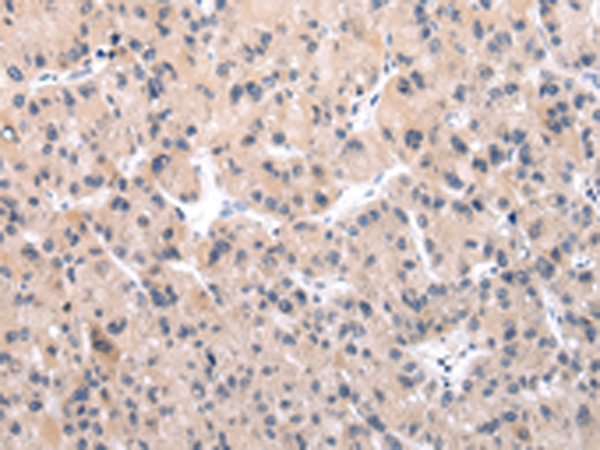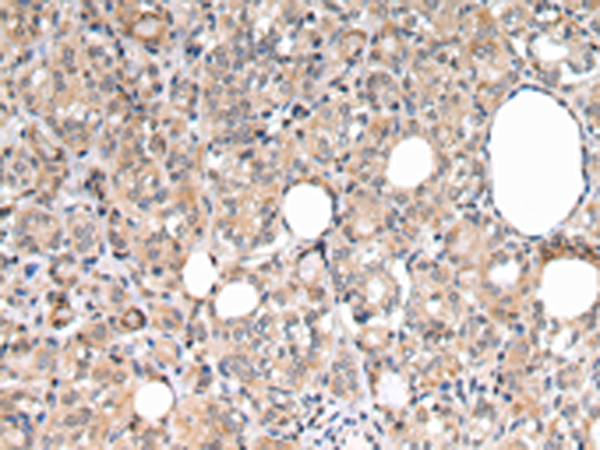

| WB | 咨询技术 | Human,Mouse,Rat |
| IF | 咨询技术 | Human,Mouse,Rat |
| IHC | 1/25-1/100 | Human,Mouse,Rat |
| ICC | 技术咨询 | Human,Mouse,Rat |
| FCM | 咨询技术 | Human,Mouse,Rat |
| Elisa | 1/2000-1/5000 | Human,Mouse,Rat |
| Aliases | IGFI, IGF-I, IGF1A |
| Host/Isotype | Rabbit IgG |
| Antibody Type | Primary antibody |
| Storage | Store at 4°C short term. Aliquot and store at -20°C long term. Avoid freeze/thaw cycles. |
| Species Reactivity | Human |
| Immunogen | Synthetic peptide of human IGF1 |
| Formulation | Purified antibody in PBS with 0.05% sodium azide and 50% glycerol. |
+ +
以下是为您整理的模拟参考文献示例(非真实文献,供格式参考):
1. **《Anti-IGF1R monoclonal antibodies in cancer therapy》**
作者:Sachdev D, Yee D
摘要:探讨抗IGF1受体单克隆抗体(如Figitumumab)在乳腺癌治疗中的作用,通过阻断IGF1信号通路抑制肿瘤生长,但部分患者出现耐药性。
2. **《Development of a sensitive ELISA for IGF1 detection using novel monoclonal antibodies》**
作者:Smith J et al.
摘要:报道一种基于新型IGF1单克隆抗体的高灵敏度ELISA检测法,可精准量化血清IGF1浓度,应用于内分泌疾病诊断。
3. **《IGF1-neutralizing antibodies enhance muscle regeneration in murine models》**
作者:Lee H, et al.
摘要:研究IGF1中和抗体对小鼠肌肉细胞分化的影响,发现其通过抑制IGF1/mTOR通路促进卫星细胞活化,加速损伤后肌肉再生。
4. **《Targeting IGF1 signaling: Therapeutic potential of antibody-based approaches》**
作者:Jones R, et al.
摘要:综述类文章,总结IGF1抗体在癌症、代谢疾病中的应用机制,讨论联合用药策略及降低高血糖副作用的解决方案。
---
如需查找真实文献,建议使用以下关键词在PubMed/Google Scholar检索:
- "IGF1 antibody therapeutic application"
- "IGF1R monoclonal antibody cancer"
- "IGF1 immunoassay development"
Insulin-like growth factor 1 (IGF1) is a hormone primarily involved in growth regulation, metabolism, and cellular differentiation, with structural similarity to insulin. Dysregulation of IGF1 signaling is linked to diseases such as cancer, diabetes, and age-related disorders. IGF1 antibodies are immunological tools designed to target and bind IGF1 or its receptor (IGF1R), modulating their activity. These antibodies are widely employed in research, diagnostics, and therapeutic development.
In research, IGF1 antibodies enable the study of IGF1 expression, localization, and interaction with receptors in tissues, notably in cancer biology where IGF1/IGF1R pathways drive tumor proliferation and survival. Diagnostic applications include immunoassays (e.g., ELISA, immunohistochemistry) to measure IGF1 levels in conditions like growth disorders or metabolic syndromes. Therapeutically, monoclonal antibodies (e.g., figitumumab, cixutumumab) have been developed to block IGF1R signaling, aiming to inhibit tumor growth. However, clinical trials have shown mixed results, highlighting challenges like pathway redundancy and drug resistance.
Recent advances focus on bispecific antibodies or combination therapies to enhance efficacy. Additionally, IGF1 antibodies are explored in aging research, as IGF1 decline correlates with age-related muscle loss and cognitive decline. Despite their versatility, optimizing specificity, minimizing off-target effects, and identifying patient subgroups that benefit most remain critical areas of development. Overall, IGF1 antibodies are pivotal in unraveling the hormone's complex roles and translating insights into clinical applications.
×